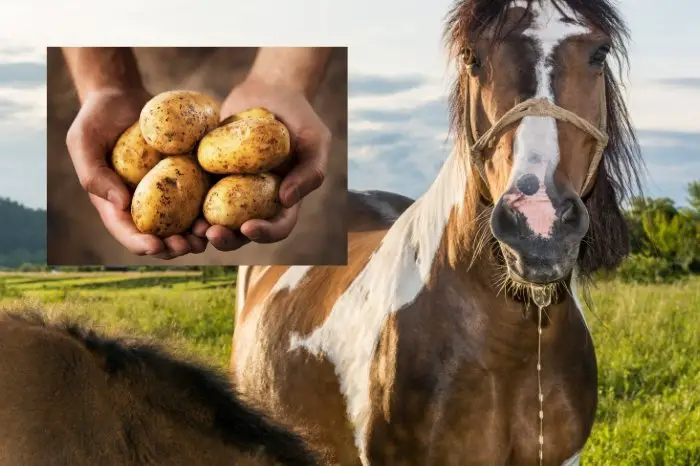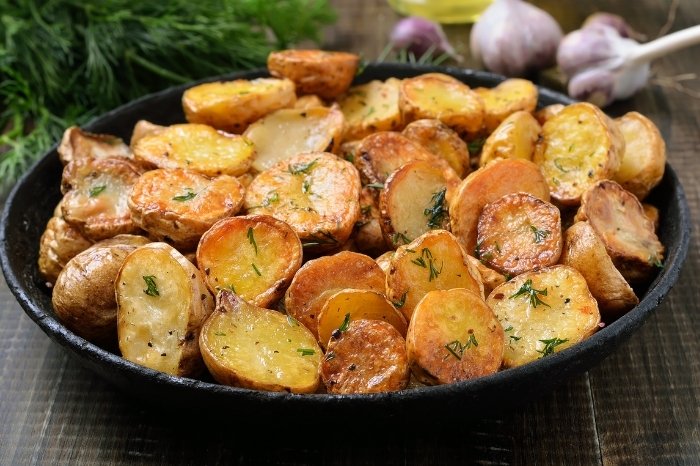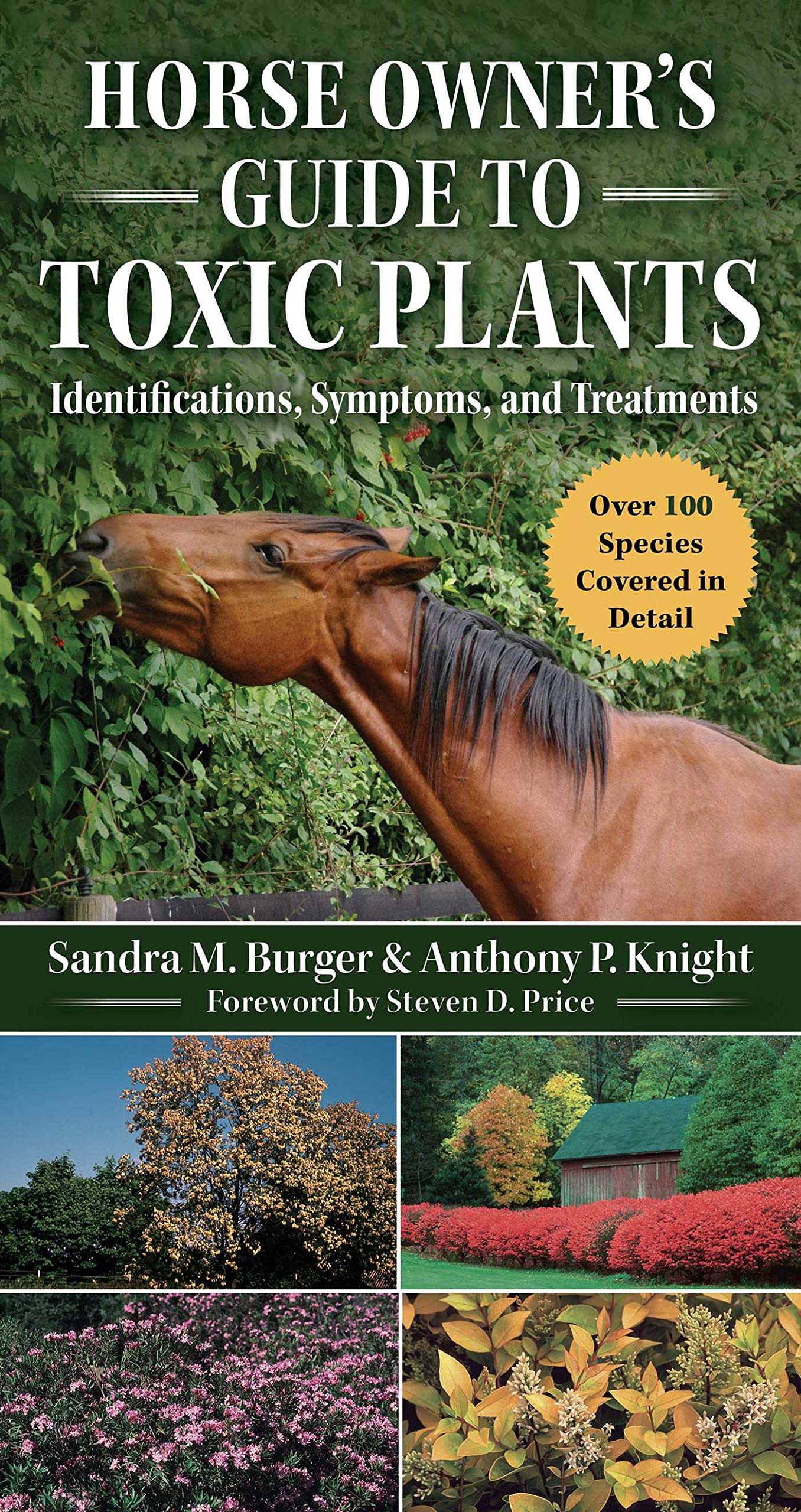Last Updated on May 7, 2022
Can horses eat potatoes, or are potatoes toxic to horses? Let’s find out whether feeding potatoes to horses is a good idea!
Can Horses Eat Potatoes?
Potatoes are toxic to horses, and they should not be fed to horses. A small amount of potatoes is unlikely to harm a large horse, but you should never deliberately feed potatoes to your horse.
The reason that potatoes are considered to be poisonous to horses is that they are part of the nightshade family of plants. All plants from this family are toxic to horses, cattle, and other livestock.

This group of plants, including potatoes, contain high levels of solanine. This is particularly concentrated in raw potatoes and is normally broken down when the potato is cooked. So horses and humans should both avoid eating potatoes when they are raw.
Some horses can tolerate a small amount of raw potato, but it is impossible to predict how every individual horse will react to eating this toxic vegetable. For this reason, it is better to avoid feeding raw potatoes to horses altogether.
Unlike humans, horses are not able to vomit. This means that if they eat something that is toxic, it must pass through the entire digestive system. This is why horses are more likely to be poisoned, as they cannot eliminate toxic material by vomiting.
Click Here to Get Info About:
Can Horses Eat Potatoes That Are Cooked?
Potatoes that have been peeled and cooked contain lower levels of solanine, and will not be as toxic to horses as raw potatoes. However, potatoes are not part of the natural diet of horses, and we would suggest that you avoid feeding potatoes to horses altogether. If a horse consumes a small amount of cooked potato it is unlikely to do any harm, so there is no need to panic if your horse takes a piece of cooked potato from your picnic box.
The other reason to avoid feeding potatoes to horses is that they are a starchy vegetable, packed full of carbohydrates. This means they can cause horses to gain weight if they are consumed in large amounts.

What Other Vegetables Are Toxic To Horses?
Feeding treats to horses can be a bit of a minefield, as there are quite a few vegetables that are toxic to horses! Luckily, these tend to belong to specific groups of families of vegetables, making it easier to identify which vegetables are poisonous when fed to horses.
We’ve already discovered that potatoes are a plant that is part of the nightshade family, and there are some other plants that also fall under this category. The main one to avoid is the tomato, as the fruits and plants are both toxic to horses. They can cause problems including diarrhea, constipation, reduced gut function, and an increased heart rate.
Another group of vegetables that are toxic to horses is the brassica family – this includes broccoli, cabbage, cauliflower, Brussels sprouts, and kale. The sugars in cruciferous vegetables can cause large quantities of gas to be produced when they are digested. As horses are not able to burp, this gas will become trapped in the digestive system and cause considerable digestive discomfort.
Horses cannot eat any plants from the allium family, including onions, garlic, shallots, leeks, and chives. These all contain a chemical that will damage red blood cells in horses, potentially leading to anemia.
Rhubarb is toxic to horses, as it contains high levels of calcium oxalates. This can cause significant damage to the urinary and digestive systems of the horse, leading to kidney failure.
The final vegetable to avoid feeding to horses is the avocado. This includes the avocado fruit, and all parts of the tree as well. If consumed by horses, avocados will cause the heartbeat to become irregular, with restricted breathing and colic symptoms.
Horse Owner’s Guide to Toxic Plants: Identifications, Symptoms, and Treatments
If your horse enjoys eating fruit, you should always avoid feeding the seeds, stones, and pips found inside fruits such as apples, pears, apricots, peaches, and plums. Not only can these potentially become lodged and cause choking, but they also contain high levels of arsenic or cyanide, both of which are poisonous to horses.
Check Out How To Raise A Horse – Horse Care Explained!
Summary – Can Horses Eat Potatoes?
So, as we have learned, horses cannot eat raw potatoes as they contain high levels of solanine, a compound that is toxic to horses. This is normally destroyed when potatoes are cooked, but it is still not recommended to feed cooked potatoes to horses. Other vegetables to avoid feeding to horses are other members of the nightshade family, such as tomatoes, and any type of brassica vegetable.
We’d love to hear your thoughts on can horses eat potatoes! Do you worry that your horse might have eaten some potatoes that will make him ill? Or perhaps you’ve got some questions about the best treats to feed to horses? Leave a comment below and we’ll get back to you!
FAQ’s

Kate Chalmers is a qualified veterinary nurse who has specialized in horse care for the vast majority of her career. She has been around horses since she was a child, starting out riding ponies and helping out at the local stables before going on to college to study Horse Care & Management. She has backed and trained many horses during her lifetime and competed in various equestrian sports at different levels.
After Kate qualified as a veterinary nurse, she provided nursing care to the patients of a large equine veterinary hospital for many years. She then went on to teach horse care and veterinary nursing at one of the top colleges in the country. This has led to an in-depth knowledge of the care needs of horses and their various medical ailments, as well as a life-long passion for educating horse owners on how to provide the best possible care for their four-legged friends.
Kate Chalmers BSc (Hons) CVN, Dip AVN (Equine) Dip HE CVN EVN VN A1 PGCE

